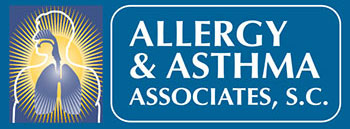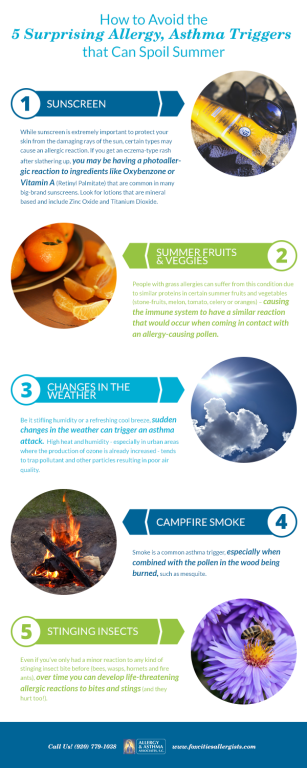Rather than lazy, hazy and crazy — summer can be sneezy, itchy and wheezy for those with allergies and asthma. Millions of Americans are allergic to grass pollen, which can trigger that runny nose or itchy eye from late spring to early summer. However, common summer standbys such as sunscreen, campfires or even an epic thunderstorm can lead to an allergic reaction as well.
The American College of Allergy, Asthma and Immunology (ACAAI) highlights these five unsuspecting summer allergy and asthma triggers and recommends solutions to prepare yourself incase they strike!
1. Sunscreen.
While sunscreen is extremely important to protect your skin from the damaging rays of the sun, certain types may cause an allergic reaction. If you get an eczema-type rash after slathering up, you may be having a photoallergic reaction to ingredients like Oxybenzone or Vitamin A (Retinyl Palmitate) that are common in many big-brand sunscreens. Look for lotions that are mineral based and include Zinc Oxide and Titanium Dioxide. Don’t worry if this type of sunscreen doesn’t seem to rub well – mineral based sunscreens are not meant to penetrate the skin, leaving some sporting that less-desirable lifeguard coated white nose. However, mineral based brands tend to protect better against UVA rays, and are less likely to cause allergic reactions in sensitive skin types. An allergist can also run tests to learn what ingredients you should avoid.
2. Summer fruits and veggies.
Whether you’re going for it or not, the appearance of a bee-stinged lip after you sink your teeth into a juicy peach may be an indication of oral allergy syndrome. People with grass allergies can suffer from this condition due to similar proteins in certain summer fruits and vegetables (stone-fruits, melon, tomato, celery or oranges) – causing the immune system to have a similar reaction that would occur when coming in contact with an allergy-causing pollen. Anaphylaxis, which is a life-threatening reaction, can occur in about 2% of cases — so see an allergist for a skin prick test to determine whether you should carry portable epinephrine. The simple solution is avoiding the offending food, or just put up with the annoying but short-lived (and seldom dangerous) reaction. If avoiding the food is a problem, cooking or peeling the skin off can help eliminate and reduce any reaction.
3. Changes in the weather.
Be it stifling humidity or a refreshing cool breeze, sudden changes in the weather can trigger an asthma attack. High heat and humidity – especially in urban areas where the production of ozone is already increased – tends to trap pollutant and other particles resulting in poor air quality. And see those thunder clouds rolling in? Be on alert for a potential allergy attack after the storm blows through as storms can stir up particles in the air, irritating those with asthmatic symptoms. Discuss an action plan with your allergist to be sure you are keeping your asthma in check no matter the season or the temperature.
4. Campfire smoke.
Smoke is a common asthma trigger, especially when combined with the pollen in the wood being burned, such as mesquite. If you don’t want to miss out on time around the fire, sit upwind of the smoke, volunteer to assemble the s’more fixings and let a friend toast your ‘mallow for you.
5. Stinging insects.
Even if you’ve only had a minor reaction to any kind of stinging insect bite before (bees, wasps, hornets and fire ants), over time you can develop life-threatening allergic reactions to bites and stings (and they hurt too!). Cover up and avoid brightly colored clothing while working in the yard, be cautious with fragrances or perfume and watch out when eating or drinking anything sweet – these all attract those buzzy stinging insects. Ask an allergist if you are susceptible to a more severe reaction, and carry portable epinephrine just in case you are stung.
Your local allergist can perform allergy testing to determine the source of your misery and help you find relief. Most involve a simple, non invasive skin prick test and results are delivered quick so you can get back to your summer fun! Visit www.AllergyAndAsthmaRelief.org to learn more about summer allergies.



